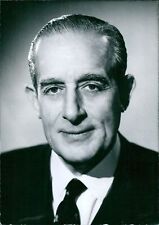When you click on links to various merchants on this site and make a purchase, this can result in this site earning a commission. Affiliate programs and affiliations include, but are not limited to, the eBay Partner Network.
Up for sale "Argentine Diplomat" Alejandro Orfila Signed First Day Cover Dated 1968.
1925 in Mendoza, Argentina) is an Argentine retired career diplomat. Born to Catalan immigrants who had become moderately
successful Mendoza Province vintners,
Alejandro Orfila received a Law Degree at the University of Buenos Aires in
1945. The following year, following political science studies at Stanford University, he
was assigned to the Argentine Embassy in Moscow; in 1948, however, he was
expelled from the Soviet Union on the
grounds of espionage. Transferred to the United States, he was appointed
Argentine Consul General to San Francisco and later New York, where
he remained until his father's death in 1952 compelled him to return to the
family business in Mendoza. Offered the prestigious post of Director of
Information at the recently established Organization of American
States (OAS), Orfila left for Washington, D.C. in 1953. There,
he forged close contacts in the U.S. capital and, after becoming Argentine
Ambassador to the U.S. in 1958 and to Japan in 1960, he formed an
influential K Street lobbying firm
in 1962, specializing in the interests of U.S. firms investing in or trading
with Latin America. In 1964 he became the political adviser to the Managing
Director of the Adela Investment Company, the largest multinational development
corporation for growing the Latin American economy. Close to President Juan Perón since his days in the Soviet Union, Orfila was
appointed Ambassador to the United States by the populist Argentine leader,
back in power in 1973 after an 18-year-long exile. Upon the retirement of Ecuatorian statesman Galo Plaza from the post of Secretary General of the OAS on 17 May 1975, Orfila was
elected to replace him. In this capacity, he moved quickly to repair the OAS's
relationship with its most important member, the United States. Inheriting an
OAS closely identified with the Non-Aligned Movement, he dismissed a number of Plaza's
appointees looked upon unfavorably by U.S. Secretary of State Henry Kissinger. Preferring his own brand of "gala
diplomacy" to confrontation, Orfila was fond of enlisting his sumptuous
beltway home for diplomatic dinners in the interest of assuaging differences. Orfila's
influence in U.S. foreign policy circles, however, remained marginal until the
advent of the Administration of U.S. President Jimmy Carter in early 1977. Orfila rallied support in the
OAS for Carter's campaign pledge to renegotiate U.S. presence in the Panama Canal
Zone, a contentious issue across Latin America. The Panama Canal Treaty was
signed at OAS headquarters in September of that year. Taking the OAS into a
more active role in Latin America's economic development than had been the case
before, Orfila facilitated the Inter-American Development Bank as a means to provide
these governments an alternative to the high-interest credit markets in the
world's financial capitals, a policy that backfired somewhat after many of
these nations entered a debt repayments crisis in 1981. Supported in many circles
for his long-standing anti-communist policies, Orfila nevertheless actively
opposed the tide of human rights abuses in
Latin America. Working with President Carter and the U.S. Assistant Secretary
of State for Human Rights, Patricia Derian, he marshalled the then-dormant Inter-American Commission on Human
Rights into investigations inside repressive regimes like his
own country's, the Argentine military junta;
after looking into allegations of widespread political murders and kidnappings in September
1979, the commission's 1980 report removed any doubts as to the state of
freedoms in the country at the time, and helped lead to an improvement in the
climate of civil liberties. These moves, however, undermined Orfila's standing
in Washington after Ronald Reagan became
U.S. president in early 1981, particularly among President Reagan's foreign
policy advisers such as Jeane Kirkpatrick, who, as Republican Party campaign
adviser in 1980, chided the OAS investigations into atrocities by admonishing
them to be more supportive of "moderately repressive regimes." With
violence in the region more concentrated in Central America after 1980, Orfila
lost a valuable ally in his efforts to mediate the area's civil wars when Panamanian strongman Omar Torrijos' plane exploded in August 1981.Orfila lent the
OAS' support to the establishment of the Contadora Group in hopes of alleviating the worsening
wars in Nicaragua, Guatemala and El Salvador. This support, as well as that of the United
Nations and a number of other international bodies, failed to compensate for
President Reagan's opposition to the initiative, however. A 1982 resolution he
supported, asserting Argentina's claims on the Falkland Islands, resulted in a policy embarrassment for the
OAS after Falklands War ended in disaster. The severe economic
downturn in almost the entire western hemisphere was addressed by Orfila with
efforts to renegotiate Latin American debt repayments; this met with opposition
in the Reagan Administration on this, as well, and on 26 October 1983, the OAS
voted to condemn the U.S. invasion of Grenada,
making Orfila's policy rift with Reagan final. Towards the end of the year,
accusations of influence peddling arose against Orfila. Increasingly unable to
exert credibility despite the lack of evidence for the allegations, on 21 June
1984, Secretary General Orfila resigned his post, expressing frustration over
the OAS' inability to influence U.S. Latin American policy during the 1980s. He
was succeeded by Brazilian Vice-Minister of Foreign
Affairs João Clemente Baena Soares.









